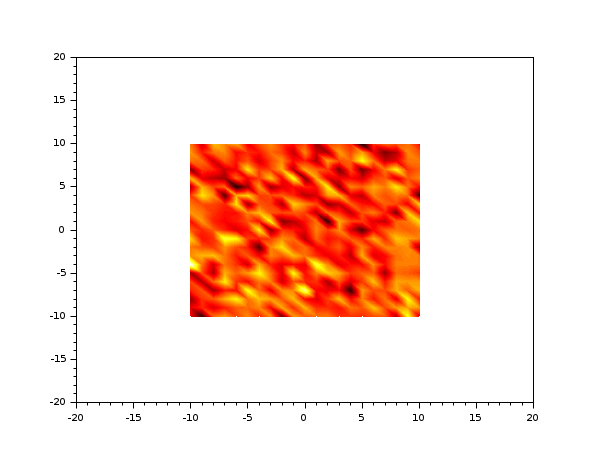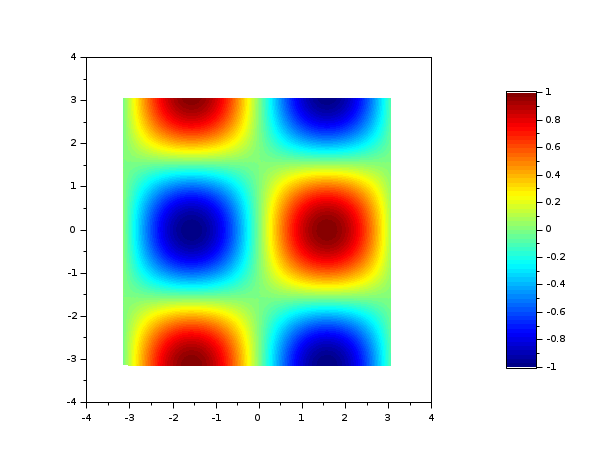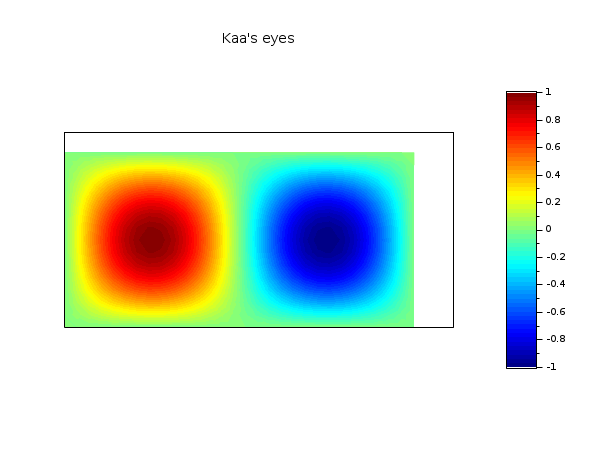Sgrayplot
smooth 2D plot of a surface using colors
Syntax
Sgrayplot(x,y,z,<opt_args>) Sgrayplot(x,y,z [,strf, rect, nax, zminmax, colminmax, mesh, colout])
Arguments
- x,y
real row vectors of size n1 and n2.
- z
real matrix of size (n1,n2).
z(i,j)is the value of the surface at the point (x(i),y(j)).- <opt_args>
This represents a sequence of statements
key1=value1,key2=value2,... wherekey1,key2,...can be one of the following: strf, rect, nax, zminmax, colminmax, mesh, colout.- strf
is a string of length 3
"xyz"(by defaultstrf= "081")- x
controls the display of captions.
- x=0
no caption.
- x=1
captions are displayed. They are given by the optional argument
leg.
- y
controls the computation of the actual coordinate ranges from the minimal requested values. Actual ranges can be larger than minimal requirements.
- y=0
no computation, the plot use the previous (or default) scale
- y=1
from the rect arg
- y=2
from the min/max of the x, y data
- y=3
built for an isometric scale from the rect arg
- y=4
built for an isometric plot from the min/max of the x, y data
- y=5
enlarged for pretty axes from the rect arg
- y=6
enlarged for pretty axes from the min/max of the x, y data
- y=7
like y=1 but the previous plot(s) are redrawn to use the new scale
- y=8
like y=2 but the previous plot(s) are redrawn to use the new scale
- z
controls the display of information on the frame around the plot. If axes are requested, the number of tics can be specified by the
naxoptional argument.- z=0
nothing is drawn around the plot.
- z=1
axes are drawn, the y=axis is displayed on the left.
- z=2
the plot is surrounded by a box without tics.
- z=3
axes are drawn, the y=axis is displayed on the right.
- z=4
axes are drawn centred in the middle of the frame box, with the box disabled.
- z=5
axes are drawn centred in the middle of the frame box, with the box enabled.
- rect
This argument is used when the second character y of argument
strfis 1, 3 or 5. It is a row vector of size 4 and gives the dimension of the frame:rect=[xmin,ymin,xmax,ymax].- nax
This argument is used when the third character z of argument
strfis 1. It is a row vector with four entries[nx,Nx,ny,Ny]wherenx(ny) is the number of subgraduations on the x (y) axis andNx(Ny) is the number of graduations on the x (y) axis.- zminmax, colminmax, mesh, colout
See fec.
Description
Sgrayplot is the same as grayplot but the
plot is smoothed. The function fec is used for smoothing. The
surface is plotted assuming that it is linear on a set of triangles built
from the grid (here with n1=5, n2=3):
The function colorbar may be used to see the color scale.
The parameter zminmax is useful for animation purpose (see an
example after) and the parameter colminmax lets the user choose a part
of the current colormap (see the fec help page).
Enter the command Sgrayplot() to see a demo.
Examples
// example #1 x=-10:10; y=-10:10;m =rand(21,21); clf() gcf().color_map = hot(64); Sgrayplot(x,y,m, strf="011", rect=[-20,-20,20,20])

// example #2 t=-%pi:0.1:%pi; m=sin(t)'*cos(t); clf() gcf().color_map = jet(64); colorbar(-1,1) Sgrayplot(t,t,m, strf="041")

// example #3: an animation display cos(t)*sin(x)sin(y). n = 30; nt = 100; x = linspace(0,2*%pi,n); y = linspace(0,%pi,n/2); z = sin(x')*sin(y); t = linspace(0,4*%pi,nt); show_window(); clf() f=gcf(); f.color_map=jet(64); colorbar(-1,1) Sgrayplot(x,y,cos(t(1))*z, strf="042", zminmax=[-1,1]) c=gce(),e=c.children xtitle("Kaa''s eyes") for i = 1:nt e.data(:,3)=matrix(cos(t(i))*z,-1,1); end

See also
- fec — pseudo-color plot of a function defined on a mesh
- fgrayplot — 2D plot of a surface defined by a function using colors
- grayplot — 2D plot of a surface using colors
- Sfgrayplot — smooth 2D plot of a surface defined by a function using colors
- colorbar — draws a vertical color bar
| Report an issue | ||
| << Sfgrayplot | 2d_plot | champ >> |